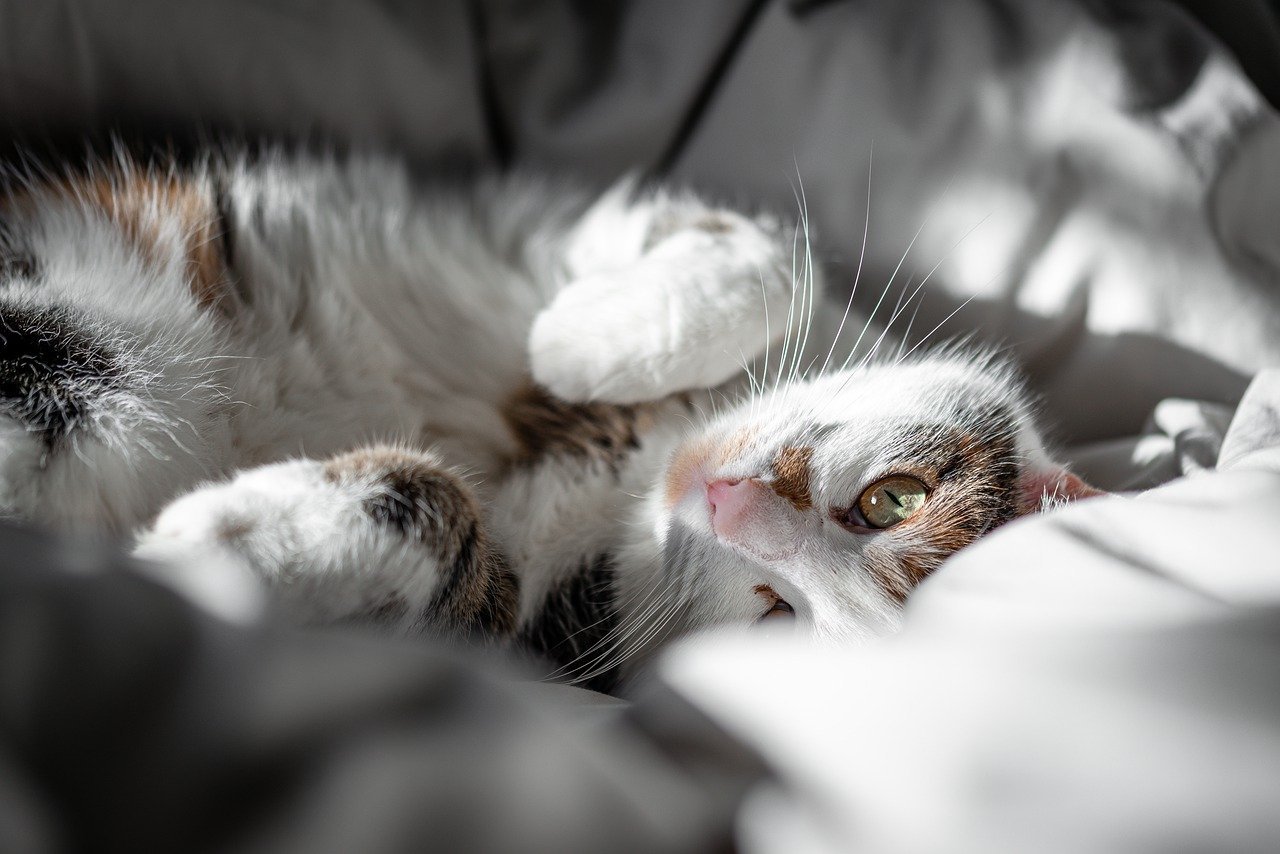As a cat owner, discovering that your feline friend has peed on your bed can be both frustrating and confusing. Cats are generally known for their cleanliness and their use of litter boxes. When they deviate from this behavior, it often signals that something is amiss. Understanding the reasons behind this behavior is crucial for resolving the issue and ensuring a harmonious living environment for both you and your cat. This comprehensive guide will explore the possible reasons why your cat is peeing on your bed and provide practical solutions to address the problem.
Understanding the Behavior: Why Does My Cat Pee on My Bed?
There are several reasons why your cat might be peeing on your bed, ranging from medical issues to behavioral problems. Identifying the underlying cause is the first step toward finding an effective solution.
1. Medical Issues
One of the primary reasons a cat might start peeing outside of the litter box is due to a medical problem. Some common medical issues include:
- Urinary Tract Infections (UTIs): UTIs can cause your cat to associate the litter box with pain, leading them to avoid it and seek out other places to urinate.
- Bladder Stones or Crystals: These can cause discomfort and frequent urination, making your cat avoid the litter box.
- Kidney Disease: This condition can lead to increased urination and accidents outside the litter box.
- Diabetes: Increased thirst and urination are common symptoms of diabetes in cats.
If you suspect a medical issue, it’s crucial to take your cat to the vet for a thorough examination and appropriate treatment.
2. Behavioral Problems
Behavioral issues can also lead to inappropriate urination. Some common behavioral reasons include:
- Stress and Anxiety: Changes in the household, such as moving to a new home, the arrival of a new pet, or changes in the owner’s schedule, can cause stress and anxiety, leading to inappropriate urination.
- Territorial Marking: Cats may pee on your bed as a way to mark their territory, especially if they feel threatened by another pet or a new person in the house.
- Litter Box Issues: Cats are particular about their litter boxes. An unclean box, the wrong type of litter, or an inconvenient location can cause your cat to seek out other places to urinate.
3. Litter Box Aversion
Litter box aversion can occur for various reasons:
- Dirty Litter Box: Cats prefer a clean litter box. If the box is dirty, they may seek out cleaner areas, like your bed.
- Uncomfortable Litter: Some cats are sensitive to certain types of litter. Switching to a more comfortable option can resolve the issue.
- Location of the Litter Box: If the litter box is in a noisy or high-traffic area, your cat may avoid it. Placing it in a quiet, accessible location can help.
Why Did My Cat Pee on My Bed? Identifying the Triggers
Identifying specific triggers that caused your cat to pee on your bed can help you address the problem more effectively. Here are some potential triggers:
1. Changes in Routine
Cats are creatures of habit. Any change in their routine, such as a change in feeding schedule, a new work schedule for the owner, or even a change in the type of food, can cause stress and lead to inappropriate urination.
2. Introduction of New Pets or People
The introduction of a new pet or person into the household can make your cat feel threatened. This can lead to territorial marking behaviors, including peeing on your bed.
3. Environmental Changes
Changes in the environment, such as moving to a new home, rearranging furniture, or renovations, can cause stress and anxiety in cats. This stress can manifest as inappropriate urination.
How to Stop Your Cat from Peeing on Your Bed
Once you’ve identified the potential causes, you can take steps to address the issue and prevent future incidents. Here are some practical solutions:
1. Visit the Vet
If you suspect a medical issue, take your cat to the vet for a thorough examination. Treating any underlying medical conditions is crucial for resolving the problem.
2. Reduce Stress and Anxiety
Reducing your cat’s stress and anxiety can help prevent inappropriate urination. Here are some strategies:
- Create a Safe Space: Provide a quiet, comfortable area where your cat can retreat and feel secure.
- Maintain a Routine: Stick to a consistent feeding and play schedule to provide stability.
- Use Calming Products: Products like Feliway diffusers or calming collars can help reduce stress and anxiety in cats.
3. Address Litter Box Issues
Ensuring that your cat’s litter box is clean, comfortable, and conveniently located can prevent litter box aversion:
- Keep the Litter Box Clean: Scoop the litter box daily and change the litter regularly.
- Choose the Right Litter: Experiment with different types of litter to find one that your cat prefers.
- Optimize the Location: Place the litter box in a quiet, accessible area away from noisy appliances or high-traffic areas.
4. Use Positive Reinforcement
Positive reinforcement can encourage your cat to use the litter box consistently:
- Reward Good Behavior: When your cat uses the litter box, reward them with treats, praise, or playtime.
- Avoid Punishment: Punishing your cat for inappropriate urination can increase stress and worsen the problem.
5. Clean Up Accidents Thoroughly
Cleaning up accidents thoroughly can prevent your cat from being attracted to the same spot again:
- Use Enzymatic Cleaners: Enzymatic cleaners break down the proteins in urine, effectively removing odors that attract cats to urinate in the same spot.
- Avoid Ammonia-Based Cleaners: Ammonia smells similar to urine and can attract your cat to the area.
Preventing Future Incidents
Preventing future incidents requires ongoing attention to your cat’s health, behavior, and environment. Here are some additional tips to help:
1. Regular Vet Check-Ups
Regular vet check-ups can help detect and treat medical issues early, preventing inappropriate urination due to health problems.
2. Monitor Changes in Behavior
Pay attention to any changes in your cat’s behavior and address them promptly. This can include changes in eating habits, litter box usage, or social interactions.
3. Provide Enrichment
Providing mental and physical enrichment can reduce stress and prevent behavioral issues:
- Interactive Toys: Toys that engage your cat’s hunting instincts can provide mental stimulation.
- Scratching Posts and Climbing Structures: These can provide physical exercise and a sense of security.
Understanding Your Cat’s Communication
Understanding that inappropriate urination is often a form of communication can help you address the underlying issues more effectively. Your cat may be trying to tell you something about their health, environment, or emotional state.
1. Health Concerns
If your cat suddenly starts peeing on your bed, it could be a sign of a health issue that needs attention. Always rule out medical problems first by consulting with your vet.
2. Environmental or Emotional Triggers
Consider any recent changes in your cat’s environment or routine that might be causing stress or anxiety. Addressing these triggers can help resolve the problem.
Conclusion
Discovering that your cat is peeing on your bed can be frustrating, but understanding the reasons behind this behavior is crucial for finding a solution. Whether the issue is medical, behavioral, or environmental, addressing the underlying cause with patience and care can help restore harmony to your home.
By taking steps to reduce your cat’s stress, ensuring their litter box is clean and comfortable, and providing regular vet care, you can prevent future incidents and foster a happy, healthy relationship with your feline friend. Remember, your cat’s behavior is a form of communication, and addressing their needs with empathy and understanding is key to resolving any issues.
Discover more from EMMOCEB
Subscribe to get the latest posts sent to your email.






